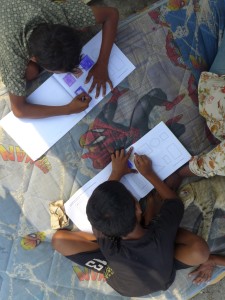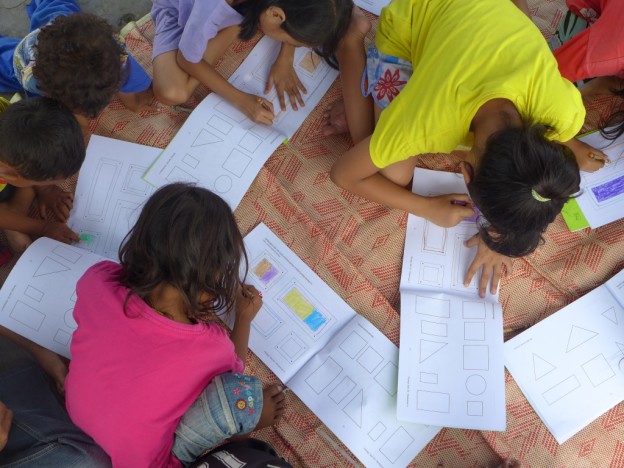SEEDS workers in Jakarta work with local charity Yayasan Pendar Pagi (YPP) to run a reading garden by a busy inner-city railway line, teaching children who are not in school how to read. Two of the children who attend the program are Lisa and Wulan. Lisa (7) lives in a shack by the railway with her parents, who earn a living by singing for money on public transport around the city. Wulan’s (8) father is a rubbish collector, making a living by selling used plastic for recycling.
 When they started attending the reading garden two years ago they couldn’t read at all. First they learnt to recognise shapes and patterns, and to hold a pencil and colour in shapes and draw, to listen to stories and to make sense of a series of pictures. Next they learnt some letters, and started to combine them to read simple words, and short stories relevant to their daily lives. Even after a year, reading was still a slow and difficult process for them. But their hard work has paid off and now they can read fluently and write pretty well. More excitingly, they’ve started school, and recently were proud to report that their teacher had said they were the “cleverest readers” in the class.
When they started attending the reading garden two years ago they couldn’t read at all. First they learnt to recognise shapes and patterns, and to hold a pencil and colour in shapes and draw, to listen to stories and to make sense of a series of pictures. Next they learnt some letters, and started to combine them to read simple words, and short stories relevant to their daily lives. Even after a year, reading was still a slow and difficult process for them. But their hard work has paid off and now they can read fluently and write pretty well. More excitingly, they’ve started school, and recently were proud to report that their teacher had said they were the “cleverest readers” in the class.
Now that these girls can read, the challenge is to help them to continue to progress to become fast, expert readers, and also to support them in other areas, such as with maths. Their success is infectious: one mother has commented how she wishes she’d made her child attend regularly from the outset, and another has hinted that she might like to learn to read herself, with a group of other mums.

